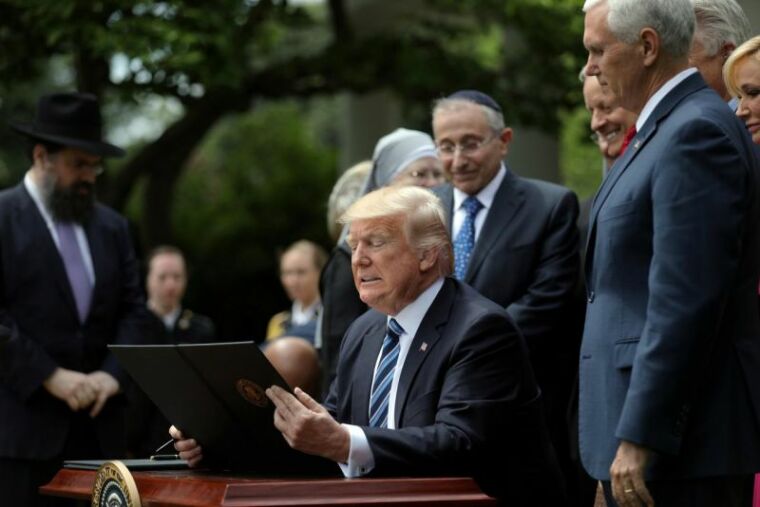Trump's religious liberty order helped charities to provide aid to 13.7 million people in need, FRC report claims

President Donald Trump's executive order on religious liberty has helped charities to provide health care and other social services to as many as 13.7 million people this past year, according to an analysis by the Family Research Council (FRC).
The order, signed by the president on May 4, 2017, provided protections for religious organizations and businesses that operate in accordance with traditional Christian values, particularly on issues such as marriage and abortion.
Prior to the signing of the order, some of the businesses and organizations were concerned that Obama-era regulations and discrimination laws could affect their operations, according to The Christian Post.
The report, compiled by the director of FRC's Center for Religious Liberty, Travis Weber, has asserted that the executive order "has had a tangible impact on the protection and priority of religious freedom throughout the executive branch over the past twelve months."
Under the mandate, the Department of Justice was instructed to issue a guidance that detailed how federal agencies could protect religious freedom.
It also allowed the Department of Health and Human Services to find the best way to deal with conscience-based objections to the Obamacare mandate that required employers to provide contraception coverage in health care plans for employees.
The exemptions to the Obamacare mandate was expanded last October to include protections for faith-based nonprofits and for-profit companies.
According to Weber, the new HHS mandate has ensured protections for at least 354 organizations, including 44 schools that have been able to provide education for over 148,000 students.
He further noted that the executive order also benefited "numerous public service organizations" that are part of umbrella groups that provide health care and other social services to about 13.7 million people each year.
One of the umbrella groups cited by Weber in the report was Catholic Charities USA, which had served over 8.7 million people in 2014 through its subsidiaries.
"Recently, in a one-year period, [Catholic Charities] collectively admitted over 5 million patients, and employed over 600,000 people," Weber noted.
"Add these 5 million patients to the 8.7 million served by Catholic Charities, and that is the number aided by the executive order and subsequent HHS exemption even when considering only several large umbrella groups operating within a one-year timeframe," he continued.
Weber argued that "millions of people would be in greater jeopardy" if the HHS exemptions had not been issued in October.
The FRC analysis was released just after Trump signed a new executive order that would create a new faith-based office called the White House Faith and Opportunity Initiative. The order, signed on the National Day of Prayer, ensures that faith-based organizations have "strong advocates in the White House and throughout the Federal Government."
 Christians don't have to affirm transgenderism, but they can’t express that view at work: tribunal
Christians don't have to affirm transgenderism, but they can’t express that view at work: tribunal Archaeology discovery: Medieval Christian prayer beads found on Holy Island
Archaeology discovery: Medieval Christian prayer beads found on Holy Island Presbyterian Church in America votes to leave National Association of Evangelicals
Presbyterian Church in America votes to leave National Association of Evangelicals Over 50 killed in 'vile and satanic' attack at Nigerian church on Pentecost Sunday
Over 50 killed in 'vile and satanic' attack at Nigerian church on Pentecost Sunday Ukrainian Orthodox Church severs ties with Moscow over Patriarch Kirill's support for Putin's war
Ukrainian Orthodox Church severs ties with Moscow over Patriarch Kirill's support for Putin's war Islamic State kills 20 Nigerian Christians as revenge for US airstrike
Islamic State kills 20 Nigerian Christians as revenge for US airstrike Man who served 33 years in prison for murder leads inmates to Christ
Man who served 33 years in prison for murder leads inmates to Christ


 Nigerian student beaten to death, body burned over ‘blasphemous’ WhatsApp message
Nigerian student beaten to death, body burned over ‘blasphemous’ WhatsApp message 'A new low': World reacts after Hong Kong arrests 90-year-old Cardinal Joseph Zen
'A new low': World reacts after Hong Kong arrests 90-year-old Cardinal Joseph Zen Iran sentences Christian man to 10 years in prison for hosting house church worship gathering
Iran sentences Christian man to 10 years in prison for hosting house church worship gathering French Guyana: Pastor shot dead, church set on fire after meeting delegation of Evangelicals
French Guyana: Pastor shot dead, church set on fire after meeting delegation of Evangelicals ‘Talking Jesus’ report finds only 6% of UK adults identify as practicing Christians
‘Talking Jesus’ report finds only 6% of UK adults identify as practicing Christians Mission Eurasia ministry center blown up in Ukraine, hundreds of Bibles destroyed: 'God will provide'
Mission Eurasia ministry center blown up in Ukraine, hundreds of Bibles destroyed: 'God will provide' Church holds service for first time after ISIS desecrated it 8 years ago
Church holds service for first time after ISIS desecrated it 8 years ago Burger King apologizes for 'offensive campaign' using Jesus' words at the Last Supper
Burger King apologizes for 'offensive campaign' using Jesus' words at the Last Supper Uganda: Muslims abduct teacher, burn him inside mosque for praying in Christ’s name
Uganda: Muslims abduct teacher, burn him inside mosque for praying in Christ’s name